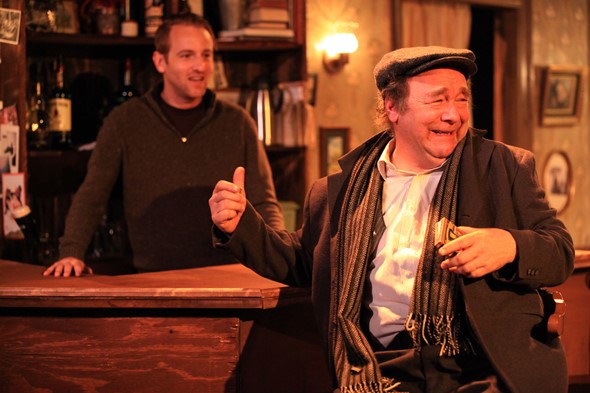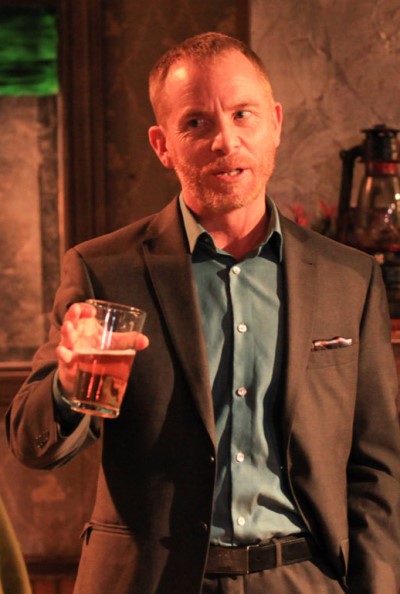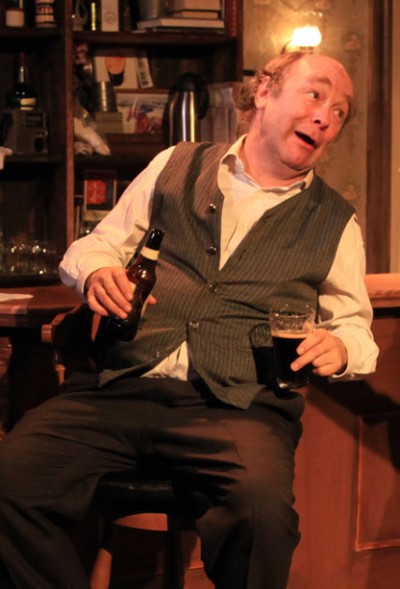‘The Weir’ at Irish Theatre: Ghosts and laughs abound — until hidden demons come to light

Review: “The Weir” by Conor McPherson, produced by Irish Theatre of Chicago at The Den, extended through Feb. 4. ★★★★
By Lawrence B. Johnson
It’s a play about hauntings, Conor McPherson’s “The Weir,” a dark and sharply drawn comedy of the unconscious now enjoying an infectious – and, happily, extended — run by the Irish Theatre of Chicago. Ghosts, the ones within us, fill the rural pub where “The Weir” unfolds: Five characters quite recognizably and sufficiently stand in for the lot of frail, erring, rueful humanity.
 If “The Weir” is distinctively Irish, rooted in the timeless tradition of ghost stories that is McPherson’s inheritance, the depth and breadth of its appeal and connection ultimately exceed by far the modest frame of the Emerald Isle. There’s much laughter here, great pain, general uncertainty and the glimmer of redemption – the known universe of us all.
If “The Weir” is distinctively Irish, rooted in the timeless tradition of ghost stories that is McPherson’s inheritance, the depth and breadth of its appeal and connection ultimately exceed by far the modest frame of the Emerald Isle. There’s much laughter here, great pain, general uncertainty and the glimmer of redemption – the known universe of us all.
The first three characters we meet – the pub owner Brendan (played by Bradley Grant Smith), the local garage mechanic Jack (Brad Armacost) and the handyman Jim (Jeff Christian) – are downing pints of beer and small whiskeys and reveling in the news that an attractive woman from Dublin has rented a long-empty house in the village. What really has them going is the report that she’s being squired about, in a familiarizing sort of way, by their old pal Finbar (Dan Waller), who is a married man.
Soon enough, Finbar’s welcoming show-around brings him and the lady to Brendan’s pub. The lads, all friends from childhood, salt of the earth and rough in their speech, greet newcomer Valerie (Sarah Wellington) with fulsome banter untrimmed in its embracing zest. She smiles indulgently through it all, accepts a glass of white wine (hustled from Brendan’s living quarters as there’s assuredly none behind the bar) and quickly finds herself regaled with the history and legends of this ancient ground.
 Inevitably, the accounts take on the fascination of personal remembrance – of inhabitants now passed away, of odd events and phenomena experienced first hand: forms half seen or keenly sensed, strange knockings in the night. For this new audience of one, the boys have opened their treasury of ghost stories, tales well conditioned from many tellings, immaculate in detail and delivered with an innate command of pace and effect.
Inevitably, the accounts take on the fascination of personal remembrance – of inhabitants now passed away, of odd events and phenomena experienced first hand: forms half seen or keenly sensed, strange knockings in the night. For this new audience of one, the boys have opened their treasury of ghost stories, tales well conditioned from many tellings, immaculate in detail and delivered with an innate command of pace and effect.
Only three of the four men join in the storytelling. It’s barman Brendan’s lot to refill drinks and chime in quietly here and there, though Bradley Grant Smith lends this catalytic role a notable presence and engaging charm. Only slightly more voluble is the shy handyman Jim – until on an impulse he launches into a chilling tale about a grave-digging job he once did in a pouring rain when he was already sick as a dog, and the bizarre chat he had with the guy who turned out to be the…Well, it was beyond strange.
Jeff Christian’s monologue, fraught with the backgrounding minutiae of an expert bard and offered in a husky, resonant voice, held the audience in rapt silence. And then he shuffled back to his corner of the bar scarcely to be heard from again.
 Finbar, himself the owner of a pub apparently more grand than this one, is the most successful of the four men. He’s the only one wearing a suit – and of course he’s the one waltzing Valerie around the neighborhood. But in Dan Waller’s finely measured performance, we see that Finbar is still very much one of the lads, and the ghostly story he tells is about himself, about being in the grip of mortal fear. By the time he’s finished, you really don’t care to be looking over your shoulder.
Finbar, himself the owner of a pub apparently more grand than this one, is the most successful of the four men. He’s the only one wearing a suit – and of course he’s the one waltzing Valerie around the neighborhood. But in Dan Waller’s finely measured performance, we see that Finbar is still very much one of the lads, and the ghostly story he tells is about himself, about being in the grip of mortal fear. By the time he’s finished, you really don’t care to be looking over your shoulder.
You might say, however, that “The Weir” is, at its heart, a play about the fourth man, Jack the mechanic. He’s older than the others, and in Brad Armacost’s luminous, larger-than-life, riotously funny turn, the natural comedian of the group. Jack is self-indulgently aware of his comic flair. He nourishes it, hones it, thrives on it. And hides behind it. He has two expansive stories to tell, the first a spooky bit that involves the very house Valerie has rented, for which lapse of discretion Finbar chides him. The second is quite a different sort of ghost story, and it comes only after the evening of tales has spurred Valerie to offer up an arresting, indeed tragic story of her own.
 Hers is personal, and dreadful, and explains why she has withdrawn from Dublin to this little patch of a community. Sarah Wellington, who had spent the evening chiefly as an attentive listener, brought pounding conviction to Valerie’s outpouring of grief and its link to the ghost that torments her. Upon hearing this melancholy, haunting and evidently true tale, Armacost’s comical alcoholic stepped out of his funnyman’s skin to describe a ghost of his own creation, likewise real, awful and unshakable. His lengthy monologue, a virtual soliloquy, was at once a confession and an epiphany, and Armacost delivered it with rattling power and pain and, arguably, relief.
Hers is personal, and dreadful, and explains why she has withdrawn from Dublin to this little patch of a community. Sarah Wellington, who had spent the evening chiefly as an attentive listener, brought pounding conviction to Valerie’s outpouring of grief and its link to the ghost that torments her. Upon hearing this melancholy, haunting and evidently true tale, Armacost’s comical alcoholic stepped out of his funnyman’s skin to describe a ghost of his own creation, likewise real, awful and unshakable. His lengthy monologue, a virtual soliloquy, was at once a confession and an epiphany, and Armacost delivered it with rattling power and pain and, arguably, relief.
“The Weir” makes deceptively complex demands on the ensemble, abetted here by the ever-present integrating hand of director Siiri Scott. The marvelous pub set designed Merji Veske and the expressive costumes by Aly Renee Amidei are also central to a show that is thoroughly credible and crisply inviting.
Related Links:
Performance location, dates and times: Details at TheatreinChicago.com
Official website of Irish Theatre of Chicago: IrishTheatreofChicago.org
Tags: Brad Armacost, Bradley Grant Smith, Conor McPherson, Dan Waller, Irish Theatre of Chicago, Jeff Christian, Merji Veske, Sarah Wellington, Siiri Scott

